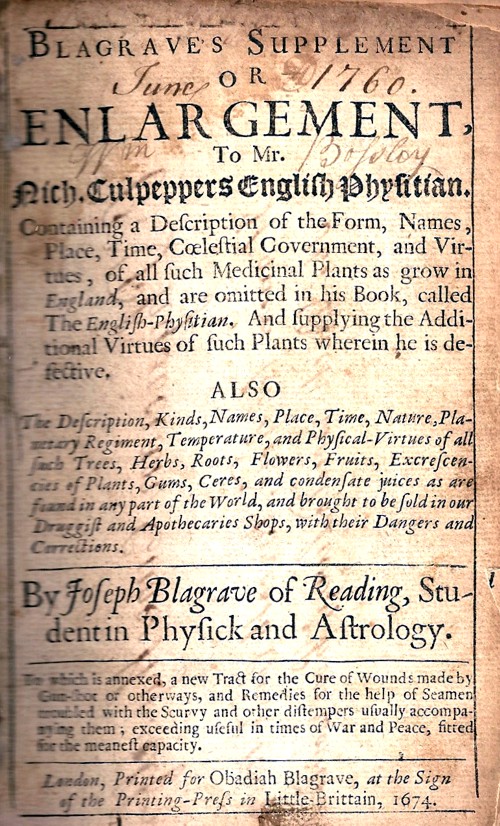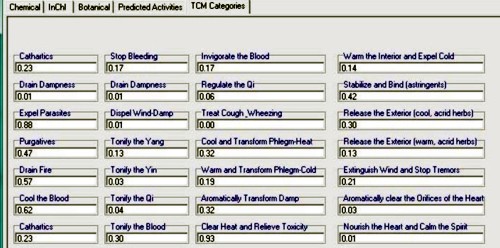University of East London
Although many university courses in quackery have now closed, two subjects that hang on in a few places are western herbalism, and traditional Chinese medicine (including acupuncture). The University of Westminster still runs Chinese medicine, and Western herbal medicine (with dowsing). So do the University of Middlesex and University of East London.
Since the passing of the Health and Social Security Act, these people have been busy with their customary bait and switch tactics, trying to get taxpayers’ money. It’s worth looking again at the nonsense these people talk.
Take for example, the well known herbalist, Simon Mills. At one time he was associated with the University of Exeter, but no longer. Perhaps his views are too weird even for their Third Gap section (the folks who so misrepresented their results in a trial of acupuncture). Unsurprisingly, he was involved in the late Prince’s Foundation for Magic Medicine, and, unsurprisingly, he is involved with its successor, the "College of Medicine", where he spoke along similar lines. You can get a good idea about his views from the video of a talk that he gave at Schumacher College in 2005. It’s rather long, and exceedingly uncritical, so here’s a shorter version to which some helpful captions have been added.
That talk is weird by any standards. He says, apparently with a straight face, that "all modern medicines are cold in the third degree"..And with ginger and cinnamon "You can stop a cold, generally speaking, in its tracks" (at 21′ 30" in the video). This is simply not true, but he says it, despite the fact that the Plant Medicine with site (of which he’s a director) which he is associated gives them low ratings
Simon Mills is also a director of SustainCare. Their web site says
SustainCare Community Interest Company is a social enterprise set up to return health care to its owners: “learning to look after ourselves and our families in ways that make sense and do not cost the earth“. It is founded on the principle that one’s health is a personal story, and that illness is best managed when we make our health care our own. The enterprise brings clinical expertise, long experience of academia, education and business, and the connections and resources to deliver new approaches.
"As its own social enterprise contribution to this project Sustaincare set up and supported Café Sustain as a demonstration Intelligent Waiting Room at Culm Valley Integrated Centre for Health in Devon". (yes, that’s Michael Dixon, again]
In the talk (see video) Mills appears to want to take medicine back to how it was 1900 years ago, in the time of Galen. The oblique speaking style is fascinating. He never quite admits that he thinks all that nonsense is true, but presumably it is how he treats patients. Yet a person with these bizarre pre-scientific ideas is thought appropriate to advise the MHRA
It’s characteristic of herbalists that they have a very long list of conditions for which each herb is said to be good. The sort of things said by Mills differ little from the 1900-year old ideas of Galen, io the 17th century ideas of Culpepper.
You can see some of the latter in my oldest book, Blagrave’s supplement to Culpepper’s famous herbal, published in 1674.
See what he has to say about daffodils
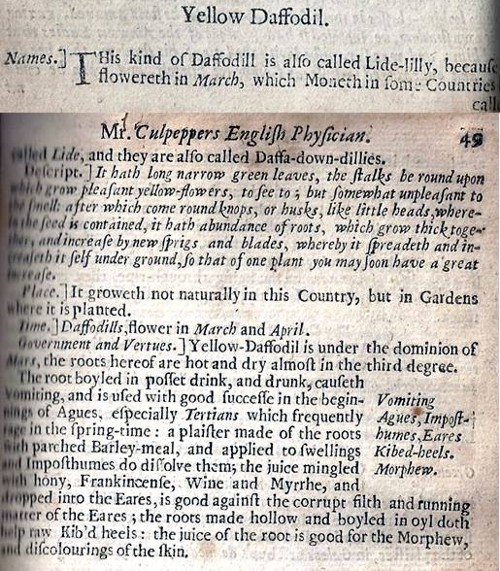
It is "under the dominion of Mars, and the roots hereof are hot and dry almost in the third degree".
"The root, boyled in posset drink, and drunk, causeth vomiting, and is used with good successe in the beginning of Agues, especiallyTertians, which frequently rage in the spring-time: a plaister made of the roots with parched Barley meal, and applied to swellings and imposthumes do dissolve them; the juice mingled with hony, frankincense, wine and myrrhe, and dropped into the Eares, is good against the corrupt filth and running matter of the Eares; the roots made hollow and boyled in oyl doth help Kib’d heels [or here]: the juice of the root is good for Morphew, and discolourings of the skin."
It seems that daffodils would do a lot in 1674. Even herbalists don’t seem to use it much now. A recent herbal site describes daffodil as "poisonous".
But the descriptions are very like those used by present day herbalists, as you can hear in Simon Mills’ talk.
Chinese medicine is even less tested than western herbs. Not a single Chinese herb has been shown to be useful for treating anything (though in a very few case, they have been found to contain drugs that are useful when purified, notably the anti-malarial compound, artemesinin). They are often contaminated, some are dangerously toxic. And they contribute to the extinction of tigers and rhinoceros because of the silly myths that these make useful medicines. The cruelty of bear bile farming is legendary.
In a recent report in China Daily (my emphasis).
In a congratulation letter, Vice-Premier Li Keqiang called for integration of TCM and Western medicine.
TCM, as a time-honored treasure of Chinese civilization, has contributed to the prosperity of China and brought impacts to world civilization, Li said.
He also urged medical workers to combine the merits of TCM with contemporary medicine to better facilitate the ongoing healthcare reform in China.
The trade in Chinese medicines survives only for two reasons. One is that thay are a useful tool for promoting Chinese nationalism. The other is that they are big business. Both are evident in the vice-premier’s statement.
I presume that it’s the business bit that is the reason why London South Bank University (ranked 114 ou ot 114) that led to one of their main lecture theatres being decorated with pictures like this.“Mr Li Changchun awarding 2010 Confucius Institute of the year to LSBU Vice Chancellor” . I’ll bet Mr Li Changchun uses real medicine himself, as most Chinese who can afford it do.
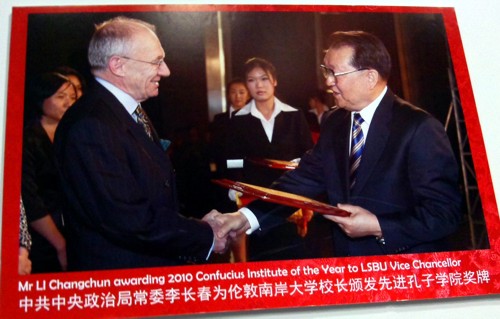
Presumably, what’s taught in their Confucius Institute is the same sort of dangerous make-believe nonsense.that’s taught on other such courses.
The "College of Medicine" run a classical bait and switch operation. Their "First Thursday lectures" have several good respectable speakers, but then they have Andrew Flower, He is "a former president of the Register of Chinese Herbal Medicine, a medical herbalist and acupuncturist. He has recently completed a PhD exploring the role of Chinese herbal medicine in the treatment of endometriosis". He’s associated with the Avicenna Centre for Chinese Medicine, and with the University of Southampton’s quack division The only bit of research I could find by Andrew Flower was a Cochrane review, Chinese herbal medicine for endometriosis. The main results tell us
"Two Chinese RCTs involving 158 women were included in this review. Both these trials described adequate methodology. Neither trial compared CHM with placebo treatment."
But the plain language summary says
"This review suggests that Chinese herbal medicine (CHM) may be useful in relieving endometriosis-related pain with fewer side effects than experienced with conventional treatment."
It sounds to me as though people as partisan as the authors of this should not be allowed to write Cochrane reviews.
Flower’s talk is followed by one from the notorious representative of the herbal industry, Michael McIntyre, talking on Herbal medicine: A major resource for the 21st century. That’s likely to be about as objective as if they’d invited a GSK drug rep to talk about SSRIs.
The people at Kings College London Institute of Pharmaceutical Sciences are most certainly not quacks. They have made a database of chemicals found in traditional Chinese medicine. It’s sold by a US company, Chem-TCM and it’s very expensive (Commercial license: $3,740.00. Academic/government license: $1,850.00). Not much open access there. It’s a good idea to look at chemicals of plant origin, but only as long as you don’t get sucked into the myths. It’s only too easy to fall for the bait and switch of quacks (like TCM salespeople). The sample page shows good chemical and botanical information, and predicted (not observed) pharmacological activity. More bizarrely, it shows also analysis of the actions claimed by TCM people.
![]()
It does seem odd to me to apply sophisticated classification methods to things that are mostly myth.
The multiple uses claimed for Chinese medicines are very like the make-believe claims made for western herbs by Galen, Culpepper and (with much less excuse) by Mills.
They are almost all untrue, but their proponents are good salesmen. Don’t let them get a foot in your door.
Follow-up
10 June 2012. No sooner did this post go public when I can across what must be one of the worst herbal scams ever: “Arthroplex“
31 July 2012. Coffee is the subject of another entry in the 1674 edition of Blagrave.
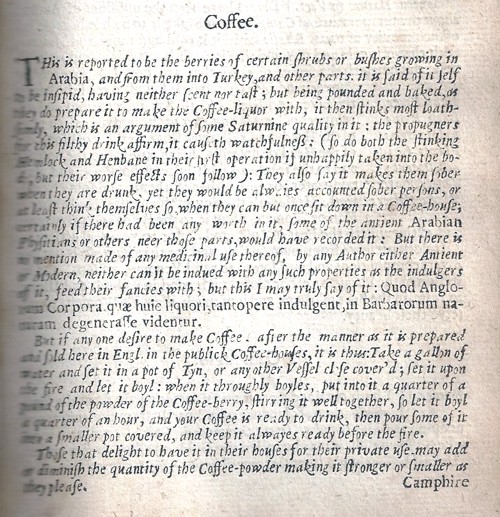
Blagrave evidently had a lower regard for coffee than I have.
“But being pounded and baked, as do it to make the Coffee-liquor with, it then stinks most loathsomly, which is an argument of some Saturnine quality in it.”
“But there is no mention of an medicinal use thereof, by any Author either Antient of Modern”
Blagrave says also
“But this I may truly say of it [coffee]: Quod Anglorum Corpora quae huic liquori, tantopere indulgent, in Barbarorum naturam degenerasse videntur,”
This was translated expertly by Benet Salway, of UCL’s History department
“that the bodies of the English that indulge in this liquor to such an extent seem to degenerate into the nature of barbarians”
My boss, Lucia Sivolotti got something very like that herself. Be very impressed.
Salway suggested that clearer Latin would have been “quod corpora Anglorum, qui tantopere indulgent huic liquori, degenerasse in naturam barbarorum videntur”.
I’d have passed that on to Blagrave, but I can’t find his email address.
I much prefer Alfréd Rényi’s aphorism (often misattributed to Paul Erdös)
“A mathematician is a machine for turning coffee into theorems”
Western herbal medicine need not be mystical nonsense, but it usually it is,
Plants often contain chemicals that have pharmacological actions, with all the possibilities for good and for harm that implies (see Plants
as medicines). It would be quite possible to teach about the plant constituents and their actions in an entirely scientific way, but it seems that this is not what courses in herbal medicine choose to do. That is why they shouldn’t be called Bachelor of Science degrees.
We have recently revealed the ancient nonsense taught at Middlesex University in its "BSc (Hons)" degree in Traditional Chinese Medicine in Dangerous Chinese medicine taught at Middlesex University as well as similar dangerous gobbledygook from the University of Westminster: see Why degrees in Chinese medicine are a danger to patients.
Western Herbal medicine does not talk about "knotted spleen Qi", but has an equally barmy mystical vocabulary of its own. They have in common a tendency to divide herbs into hot and cold, a crude and baseless classification that dates from a time when nothing was known about physiology or the causes of disease.
A recent post described the problems of finding out what exactly is taught on these courses: Not much Freedom of Information at University of Wales, University of Kingston, Robert Gordon University or Napier University
I lodged a Freedom of Information (Scotland) Act with Napier University Edinburgh on 10th August 2009. As almost always, it was refused, as was the internal review of my request. The response to the internal review came from Gerry Webber BA (Hons) 0 PHil MBA MCMI AUA (Fellow). Despite all those impressive sounding letters, he argued with a perfectly straight face that it was perfectly all right for the university to teach this sort of stuff. He ended
“On public interest grounds, I have therefore concluded that, in respect of the commercially sensitive information requested, the public interest is better served in withholding the information you have requested than in disclosing it.”
Despite all those impressive sounding letters after Dr Webber’s name, here was a solemn letter, on the university letterhead, defending the teaching of pseudoscientific nonsense The experience is surreal, but far from unique.
Although we won a judgement that compelled disclosure from the Information Commissioner for England and Wales, the Scottish law is slightly different so I had to appeal to the Scottish Information commissioner. [Download appeal]
A similar appeal was lodged for Robert Gordon’s University Aberdeen. They have already sent some homeopathy materials, and closed down the homeopathy course, as described at: Robert Gordon University stops its homeopathy course. Quackademia is crumbling. Napier University followed the same pattern, but a bit more slowly. They sent some of what I asked for without waiting for a formal judgement, after they had been contacted by the Scottish Information Commissioner.
Napier also shut down the degree from which the slides, below, were used. It is fascinating that so many places have done this shortly before what is taught is made public. Before that time the courses are defended and advertised. no doubt by people who have never given a moment’s thought to what is taught. In 2007, after my Nature article on the topic, the Glasgow Herald said
A spokeswoman for Napier University said it stood by the integrity of its BSc degrees.
“The BSc Herbal Medicine course uses an approach to teaching and training that we believe best prepares students for practice within a modern integrated healthcare system,” she said.
The university’s brochure for the course (still, carelessly, on the web at the time of writing), waxed lyrical about the herbal medicine course. Yet as soon as it becomes known what’s actually taught, the courses close.
What was taught on Napier’s Herbal Medicine “BSc”.
Materia medica starts with hot and cold herbs
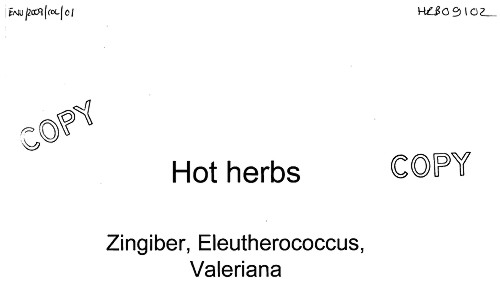
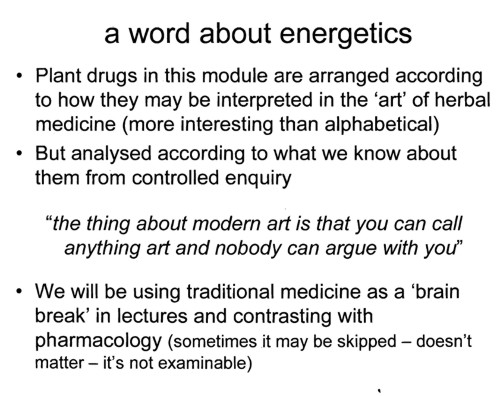
Yes, but one of the problems is that very little is known about the therapeutic actions of herbs from "controlled enquiry". The material just isn’t there to fulfil this aim. To paraphrase their quotation,,you can call anything medicine, but plenty of people will argue with you if you can’t produce the evidence.
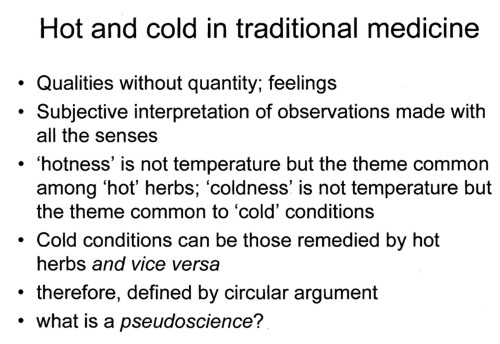
This slide strikes me as pure pre-scientific gobbledygook. All herbs and all diseases seem to fall into the ‘hot’ or ‘cold’ class. The ‘argument’ is entirely circular. Pure pseudoscience (is that what the lecturer told them in response to the last question?).
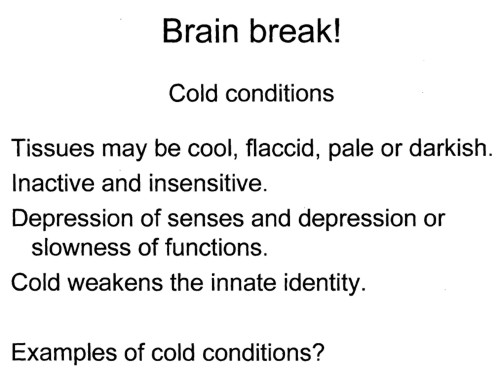
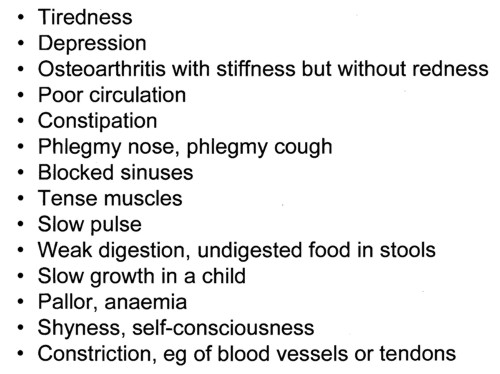
What do all these conditions have in common? They are all "cold". How can anyone take this sort of baloney seriously?
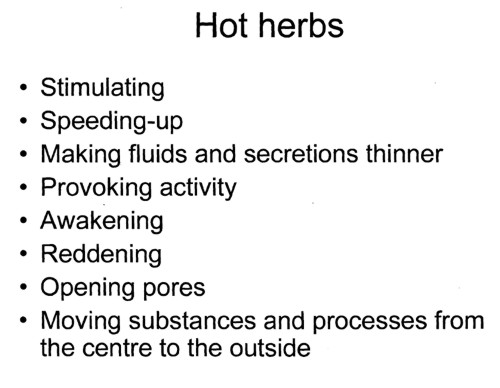
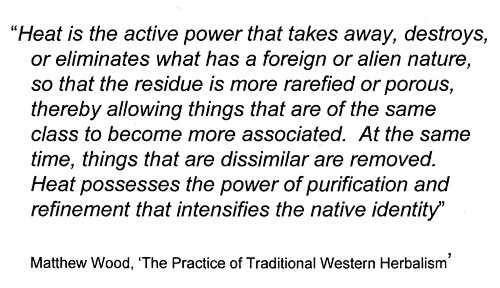
This quotation appears to have no comprehensible meaning at all. It carries overtones of the great "detox" fraud, and so perhaps is useful justification for slimming the wallets of the gullible.
Now we come to a real herb.
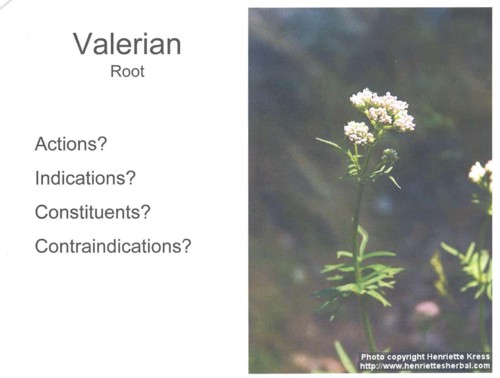
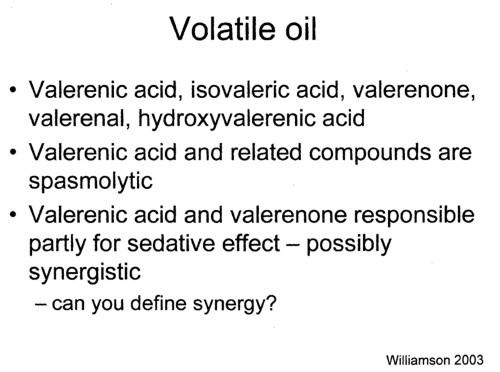
There is some real chenistry in this slide. Unfortunately it simply isn’t known whether these chemicals have any useful function. Usually it isn’t known either what dose of them you are giving in tincture of valerian. When I worked in a pharmacy in the 1950s, you could still find tincture of valerian on the shelves of a normal pharmacy, but iit soon vanished as paople realised it wasn’t much use. Disappeared from normal medicine, that is. it is still alive and well among herbalists.
Notice too, the mention of "synergy". The perpetual excuse of herbalists for giving impure mixtures of chemicals is that they might act synergistically. They are undeterred by the fact that no such synergy has ever been demonstrated properly. I asked that question ot Liz Williamson. editor of Potter’s herbal Cyclopedia, but answer came there none.
I’d be interested to know what answer was given to the last question, which isn’t as simple as it sounds. I wouldn’t mind betting it didn’t include a critical description of isobol analysis.
So what does Valerian do?
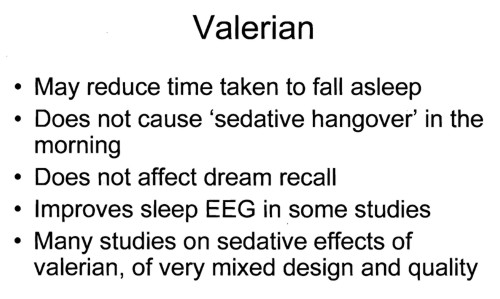
It seems, even from the lecture, that there is no unanimity that it does anything useful at all.
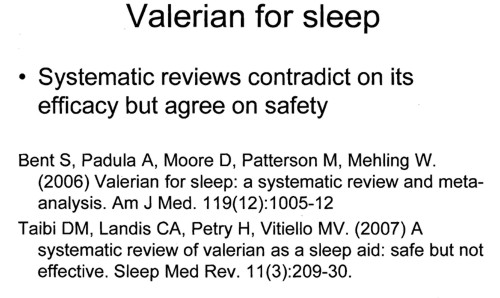
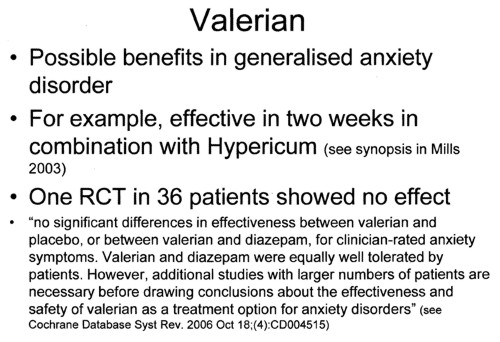
There is no worthwhile evidence to think it is useful for "generalises anxiety disorder" Let’s take another opinion.
The National Center for Complementary and Alternative Medicine (NCCAM) is the branch of the US National Institutes of Health which has spent around a billion dollars of US taxpayers’ money on research into alternative medicine, For all that effort they have failed to come up with a single useful treatment. Clearly they should be shut down. Nevertheless, as an organisation that is enthusiastic about alternative medicine, it’s interesting to see what they have to say about valerian.
What the Science Says
- Research suggests that valerian may be helpful for insomnia, but there is not enough evidence from well-designed studies to confirm this.
- There is not enough scientific evidence to determine whether valerian works for anxiety or for other conditions, such as depression and headaches.
Even NCCAM don’t pretend that there is any good reason to think it’s good for anything. So, you might ask, why are students being taught to treat people with it?
Simon Mills on "hot and cold herbs"
Many of the slides refer to a book by herbalist Simon Mills. You can see a video of a talk he gave in which he ‘explains’ "hot and cold herbs". It strikes me as pure gobbledygook. Make up your own mind.
Now take the test
This is a question from a Napier University exam paper


Which constituents are responsible for the actions of saw palmetto? Which actions would they be? This is what The National Center for Complementary and Alternative Medicine (NCCAM) says
about saw palmetto.
What the Science Says
- Several small studies suggest that saw palmetto may be effective for treating BPH symptoms.
- In 2006, a large study of 225 men with moderate-to-severe BPH found no improvement with 320 mg saw palmetto daily for 1 year versus placebo. NCCAM cofunded the study with the National Institute of Diabetes and Digestive and Kidney Diseases.
- There is not enough scientific evidence to support the use of saw palmetto for reducing the size of an enlarged prostate or for any other conditions.
- Saw palmetto does not appear to affect readings of prostate-specific antigen (PSA) levels. PSA is protein produced by cells in the prostate. The PSA test is used to screen for prostate cancer and to monitor patients who have had prostate cancer.
Magic Medicine
In the materials that I was sent, I see nothing to make me believe that herbalism is being taught as science. On the contrary, it all seems to confirm the definition given in the Patients’ Guide to Magic Medicine.

Herbal medicine BSc degrees still exist.
They are still running at the following universities.
The vice-chancellors are named because they are the people who must take responsibility for this sort of nonsense being taught in their universities.
University of East London (vice-chancellor from Feb 2010 is Patrick McGhee, who, in his previous job at University of Central Lancashire, did so much to prevent me from getting hold of their teaching materials, but then closed the courses anyway)
University of Lincoln (Vice chancellor, Professor Mary Stuart)
London Metropolitan University (vice-chancellor, (interim vice chancellor, Alfred Morris)
Middlesex University (vice-chancellor, Professor Michael Driscoll)
And, of course, the home of woo, the University of Westminster (vice-chancellor, Professor Geoffrey Petts). Their students are taught that Amethysts emit high Yin energy and that dowsing and pendulums can be used for diagnosis and treatment.
By the same token, we may congratulate Professor Dame Joan Stringer, vice-chancellor of Napier University Edinburgh for closing down the course from which these slides came. Perhaps now she should consider closing their ‘degrees’ in aromatherapy and ‘reflexology’

